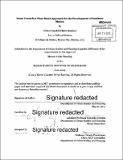Notes towards a place based approach for the development of Southern Mexico
Author(s)
Flores-Ramírez, Hećtor Cuauhtli
DownloadFull printable version (16.49Mb)
Other Contributors
Massachusetts Institute of Technology. Department of Urban Studies and Planning.
Advisor
Gabriella Carolini.
Terms of use
Metadata
Show full item recordAbstract
The spatial structure of development is of both of theoretical and policy relevance given the feedback or network effects that material wealth or income inequality may have between neighboring spatial units. In order to investigate if development is spatially structured between municipalities in Southern Mexico, I perform global and local spatial autocorrelation analysis for income per capita and other key economic and social development variables. My analysis finds, through permutation tests, statistically significant evidence of spatial (positive and negative) autocorrelation clusters in these municipios for variables like GDP per capita and poverty rates, among others. This evidence supports the argument to investigate in more depth the role of space in development policy for this region of Mexico. My spatial analysis is focused on the municipios of Southern Mexico (Chiapas, Guerrero, Hidalgo, Michoacán, Oaxaca, Puebla and Tlaxcala). Southern Mexico has consistently been the poorest region in the country since the 1940s. Persistent underdevelopment and inequality is now giving rise to crime, violence and governance challenges that urge a rethinking of development policy in this part of Mexico. In general, economic and regional development research in Mexico has not explicitly modeled the spatial effect of development and it has not been conducted at the municipality scale. An increased understanding of both spatial and municipal information is crucial to implement more effective development policies. My thesis establishes a conversation both with literature on place-based development policy, and regional development literature in Mexico.
Description
Thesis: M.C.P., Massachusetts Institute of Technology, Department of Urban Studies and Planning, 2015. Cataloged from PDF version of thesis. Includes bibliographical references (pages 65-68).
Date issued
2015Department
Massachusetts Institute of Technology. Department of Urban Studies and PlanningPublisher
Massachusetts Institute of Technology
Keywords
Urban Studies and Planning.